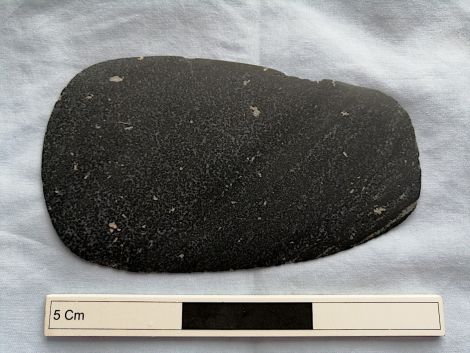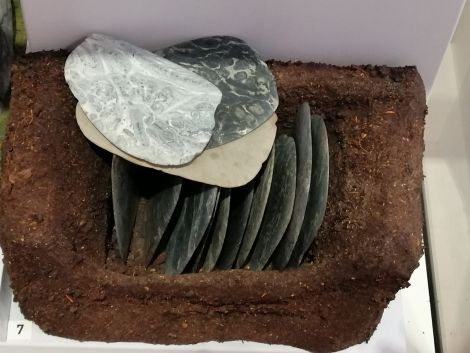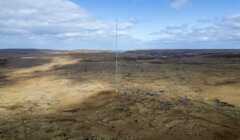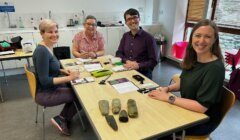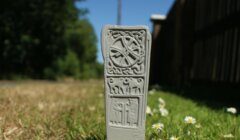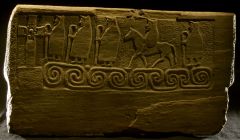Features / Neolithic knife found at Staney Hill ‘very significant’
THE RECENT find of a felsite knife in Lerwick serves as a reminder from our ancestors not to forget our connection to the land and to all those who lived on these isles before us, writes Alex Purbrick.
There is an old Chinese proverb that says that ‘to forget one’s ancestors is to be a river without a source, a tree without a root.’
When wandering through the Shetland landscape we are never far away from the memory of ancestors and are constantly reminded of their presence.
Whether it be stone circles, brochs, burial chambers or derelict crofts the lives of all of those that have walked these isles over thousands of years has woven a web of memories reminding us of where we came from and shape how we live on the land in this present day.
There is very little known about Shetland’s ancient ancestors who lived here during the Neolithic period over 5,000 years ago but their lives are still interwoven with our modern world rising to the surface when modern development carves out the earth and forcing us to pause and consider the ways they lived that were similar to ours but also very different.
A few days ago, Irvine Watt from Lerwick encountered the Neolithic world whilst walking around Staney Hill stumbling across a piece of felsite laying on the surface of backfill from a recently laid water pipe.
He recalled how “there were a lot of stones lying on the surface and they stood out well because they had been washed, almost bleached by the sun, wind and rain”.
“At first, I thought it was a rubber sole of someone’s shoe sticking out of the mud so I almost walked past it. I picked it up and having seen Shetland knives before in the museum I knew exactly what it was so took it to the museum to confirm it.”
Become a member of Shetland News
Shetland Museum curator Jenny Murray quickly identified it as a Neolithic felsite knife.
“This find is very significant,” she said. “Felsite knives are a group of highly polished tools unlike anything else found in Scotland. They appear to be unique to Shetland.
“Knives found outwith the islands (for example Edinburgh and Denmark) are found within museum collections; collected by visiting antiquarians in the 19th century.”
Whereas some felsite knives found in the isles show signs of being used for example in skinning animals, the knife found by Irvine Watt is pristine, made for a different reason and often buried in groups in peat moor and on hill tops.
Murray added: “These ritualistic knives have usually been placed side by side, similar to books on a shelf. We don’t know why some of these special knives were buried in this way.
“They were likely a votive offering to the landscape, perhaps in the hope of a good harvest or maybe an offering to the weather gods!”
Felsite was certainly regarded as an important material to Neolithic peoples and was quarried from specific sites around North Roe and Uyea in the north mainland.
Recent excavations of these quarry sites by Professor Gabriel Cooney from the University College Dublin and Dr Will Megarry from Queen’s University Belfast show that Neolithic Shetlanders were making these tools around 3,600BC.
Felsite was associated with identity and connected ancient peoples to their ancestors often found in burial sites and domestic settlements throughout Shetland.
We can try to analyse with our modern analytical, logical minds the reasons why ancient peoples would bury a beautiful object such as this felsite knife without placing a purpose or daily use on it.
But our ancestors had an intimacy with the landscape, a sensitivity towards it and did not consider the land as separate from themselves but rather a part of it.
The landscape was spiritual as well as physical; there was no differentiation. It is only now in our modern world that the land is seen purely as a resource rather than a home that sustains us and connects us to the world of our ancestors, past and future.
Become a member of Shetland News
Shetland News is asking its many readers to consider paying for membership to get additional features and services: -
- Remove non-local ads;
- Bookmark posts to read later;
- Exclusive curated weekly newsletter;
- Hide membership messages;
- Comments open for discussion.
If you appreciate what we do and feel strongly about impartial local journalism, then please become a member of Shetland News by either making a single payment, or setting up a monthly, quarterly or yearly subscription.
















